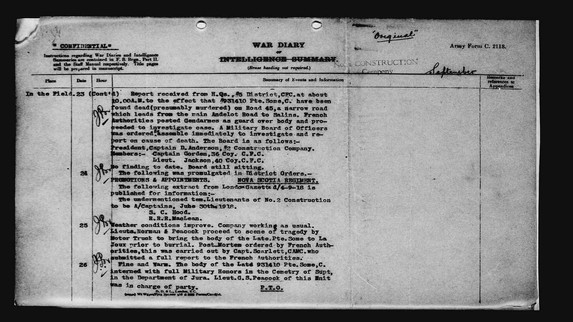Some, Charlie
- BCV.stories

- Nov 9, 2021
- 3 min read
Updated: Mar 22, 2025

Some people came so far only to have their hopes and dreams fade too suddenly. Charlie Some of No. 2 Construction Battalion was one these people. Born in Natal, a province of South Africa. Life was likely difficult for him and his family as he only knew the year of his birth, 1886, but not the day or month. In 191s, South Africa passed the Natives Lands Act that allowed Black farmers to be removed from their land. This forced many of them onto poor land in specified reserves or to work for white farmers as labour. Other repressive government measures made life even more difficult for Black men.
Charlie Some likely came to Canada sometime in the period between 1911 and 1914. He married Gertrude, known as Girty, and lived in Africville, a Black commune in Halifax along the harbour's edge. What made the relationship unusual was that Gertrude was white. In Nova Scotia of that time mixed marriages were uncommon. Where they met and where they worked is unknown.
No. 2 Construction Battalion was formed on 5 July 1916 to meet a demand from Black communities across Canada and from within the military for a segregated Black unit. The role of the battalion was to provide physical labour to support the troops at the front. This was an essential and in-demand role. In December 1916, No. 2 Construction Battalion was advised that they would be deploying to England shortly. As the battalion was not up to its required strength of 1,049 a large recruiting campaign was started. Charlie Some answered and on 13 January 1917 he enlisted in the battalion in Halifax. He sailed with them to England on 28 March 1917.
When the battalion was reduced in size and proceeded to France in May 1917, Private Some was one of the soldiers left in England. Here he was attached to a reserve battalion, awaiting the chance to deploy as a reinforcement to his battalion when they needed more soldiers. In the meantime he participated in infantry training and was able to take weekend passes to local communities in the Bramshott area.
The call to the battalion finally occurred in late May 1918. Private Some left for France with other members of the battalion, arriving at Jura on 6 June. However, he had to have one last chance at the bright lights before arriving in Jura, so he left the group on 5 June, returning to it before the train left the next day.
The time in England appears to have softened Private Some towards his military responsibilities. At Jura he was absent without leave from the evening of 30 June until he was caught at the train station in Lyons, about 150 kms to the south. Here the military police arrested him on the morning of 3 July. In August he was absent without leave from the evening of 25 August until the evening of 27 August. He got off lightly for these absences, only losing six days of pay. More embarrassingly he was also subject to 36 days of field punishment no. 1
It would appear that Private Some was on another of his escapes on the night of 22 – 23 September. On the morning of the 23rd, his body was found on a small road from Andelot to Salins. He had been attacked by an unknown assailant and killed with a cut from a sharp object. A doctor of the Canadian Army Medical Corps conducted a post-mortem examination of his body. Private Some was buried on September 26th with full military honours at Supt Cemetery, alongside his comrades who had passed away due to illness. French authorities took action to find the culprit. They eventually sent to trial and convicted Touhami Ben Mohammed, an Algerian in the French Army for his murder. The circumstances that led to Private Some's death have not yet been found.
Charlie Some had come to Canada to start a new and better life than what he had experienced in South Africa. He answered the call of service of his new home. Unfortunately any further opportunities were cut short by his untimely demise.
-BCV

.png)










Comments